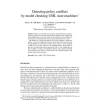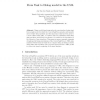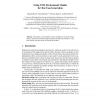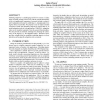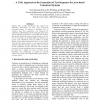123
Voted
FIW
2009
15 years 6 days ago
2009
Policies are convenient means to modify system behaviour at run-time. Nowadays, policies are created in great numbers by different actors, ranging from system administrators to lay...
121
Voted
TAMODIA
2007
15 years 3 months ago
2007
Many model-based approaches for user interface design start from a task model, for which the ConcurTaskTrees notation is frequently used. Despite this popularity and the importance...
118
Voted
SE
2008
15 years 3 months ago
2008
We propose a new method for system validation by means of testing, which is based on environment models expressed as UML state machines. A sun blind control case study serves to il...
123
Voted
AMAST
2004
Springer
15 years 6 months ago
2004
Springer
We study the semantics and refinement of mobile objects, considering an extension of core UML state machines by primitives that designate the location of objects and their moves wi...
128
click to vote
ASM
2000
ASM
15 years 6 months ago
2000
ASM
We define the dynamic semantics of UML State Machines which integrate statecharts with the UML object model. The use of ASMs allows us (a) to rigorously model the event driven run...
126
click to vote
MOMM
2009
ACM
15 years 7 months ago
2009
ACM
Modeling adaptivity is a challenging task for two reasons: 1) adaptation is usually strongly interwoven with the general functionality of the web application, separation of concer...
140
click to vote
ASWEC
2005
IEEE
15 years 8 months ago
2005
IEEE
Starting with a UML specification that captures the underlying functionality of some given Java-based concurrent system, we describe a systematic way to construct, from this speci...
119
Voted
SAFECOMP
2007
Springer
15 years 8 months ago
2007
Springer
We discuss the problem of generating test suites from UML state machines and present a method to extend the capabilities of existing automated test case generators. Current tools p...
117
click to vote
MODELS
2007
Springer
15 years 8 months ago
2007
Springer
Abstract. Separation of Concerns (SoC) is an important issue to reduce the complexity of software. Recent advances in programming language research show that Aspect-Oriented Progra...
126
Voted
MODELS
2009
Springer
15 years 9 months ago
2009
Springer
UML state machines are widely used for modeling software behavior. However state-crosscutting behaviors, such as synchronization or execution history dependence, are hard to model...
